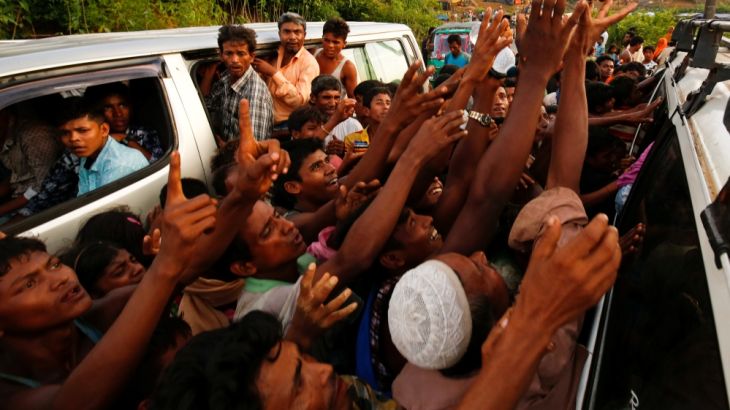Myanmar faces international condemnation over Rohingya
A chorus of international criticism aimed at Myanmar is growing over the violence against Rohingya Muslims.

Myanmar’s security forces and civilian leader Aung San Suu Kyi have been facing international condemnation over the recent plight of the Rohingya Muslim minority.
Nearly 90,000 Rohingya have flooded into Bangladesh in the past 10 days following an uptick in fighting between fighters and Myanmar‘s military in the strife-torn western Rakhine state.
Keep reading
list of 4 items‘Regime machinery operating efficiently’ as Tunisia cracks down on dissent
Why Egypt backed South Africa’s genocide case against Israel in the ICJ
US sanctions two RSF commanders as fighting escalates in Sudan’s Darfur
The Rohingya have been forced to live under apartheid-like restrictions on movement and citizenship.
|
|
The latest wave of violence, which first began last October when a small Rohingya fighter group ambushed border posts, is the worst Rakhine has witnessed in years, with the UN saying Myanmar’s army may have committed ethnic cleansing in its response.
Aung San Suu Kyi, a former political prisoner of Myanmar’s military rulers, has come under increasing fire over her perceived unwillingness to speak out against the treatment of the Rohingya or chastise the military.
She has made no public comment since the latest fighting broke out on August 25.
OPINION: Only international pressure can save Rohingya now
Yanghee Lee, the UN special rapporteur on the human rights situation in Myanmar, expressed concern earlier this week that “many thousands of people are increasingly at risk of grave violations of their human rights”.
On Monday, she was quoted by Indian media as saying the current situation is “perhaps the worst … in Myanmar in a long time”.
UN Secretary-General Antonio Guterres also urged restraint by Myanmar security forces, a spokesman said in a statement.
“The current situation underlines the urgency of seeking holistic approaches to address the complex root causes of violence,” spokesman Eri Kaneko said.
Malala Yousafzai, a Pakistani Nobel peace laureate, echoed the UN official’s condemnation over the issue in a statement on Twitter.
“Every time I see the news, my heart breaks at the suffering of the Rohingya Muslims in Myanmar,” Yousafzai, who famously survived being shot in the head by the Taliban, said.
“Over the last several years I have repeatedly condemned this tragic and shameful treatment. I am still waiting for my fellow Nobel laureate Aung San Suu Kyi to do the same,” she added.
My statement on the #Rohingya crisis in Myanmar: pic.twitter.com/1Pj5U3VdDK
— Malala (@Malala) September 3, 2017
Malaysian Foreign Minister Anifah Aman also questioned Aung San Suu Kyi’s silence.
“Very frankly, I am dissatisfied with Aung San Suu Kyi,” Anifah told AFP news agency.
“(Previously) she stood up for the principles of human rights. Now it seems she is doing nothing.”
Turkey’s President Recep Tayyip Erdogan said on Monday he was pressing world leaders to do more to help the Rohingya, who face what he has described as “genocide”.
“You watched the situation that Myanmar and Muslims are in,” Erdogan said in Istanbul, where he was attending the funeral of a Turkish soldier. “You saw how villages have been burned … Humanity remained silent to the massacre in Myanmar”.
He said Turkey would raise the issue at the United Nations General Assembly in New York later this month.
Public anger
The growing crisis threatens Myanmar’s diplomatic relations, particularly with Muslim-majority countries in Southeast Asia such as Malaysia and Indonesia where there is profound public anger over the treatment of the Rohingya.
The Maldives announced on Monday that it was severing all trade ties with the country “until the government of Myanmar takes measures to prevent the atrocities being committed against Rohingya Muslims”, the foreign ministry said in a statement.
INFOGRAPHIC: Persecution path – Following Myanmar’s fleeing Rohingya
Indonesia’s Foreign Minister Retno Marsudi met Aung San Suu Kyi, as well as Myanmar’s army chief General Min Aung Hlaing in Naypyidaw, on Monday in a bid to pressure the government to do more to alleviate the crisis.
|
|
Dozens demonstrated in front of Myanmar’s embassy on Monday, where armed police were deployed and the mission cordoned off behind barbed wire.
Pakistan also expressed “deep anguish” at the ongoing violence against the Rohingya minority in Myanmar.
Foreign Minister Khawaja Muhammad Asif on Monday called for “effective measures to prevent the recurrence of such violence” against the Muslim minority.
Iranian Foreign Minister Javad Zarif added in a recent tweet: “Global silence on continuing violence against #Rohingya Muslims. Int’l action crucial to prevent further ethnic cleansing – UN must rally.”
Since the latest fighting broke out, al-Qaeda’s offshoot in Yemen has called for retaliatory attacks against Myanmar while the Afghan Taliban urged Muslims to “use their abilities to help Myanmar’s oppressed Muslims”.
Thousands also gathered in Russia’s Chechnya region on Monday for an officially staged rally over the plight of the Rohingya.